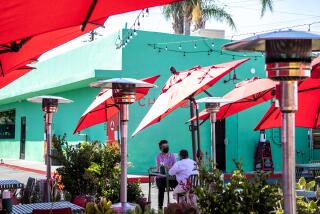Growing Cloud of Damning Evidence : Secondhand smoke: Higher lung cancer risk found among restaurant and bar workers
- Share via
Each week seems to bring more evidence of the dangers of secondhand cigarette smoke and new reports of appropriate efforts to limit the exposure of nonsmokers. Last week was no exception.
A study published in the Journal of the American Medical Assn. offers new documentation for the assertion that workers in restaurants and bars are exposed to inordinately risky levels of environmental tobacco smoke--so-called secondhand smoke.
The study was done by Dr. Michael Siegel, an epidemiologist who was at UC Berkeley when he performed his research and is now at the federal Centers for Disease Control and Prevention in Atlanta. Siegel found that measurements of environmental tobacco smoke in restaurants average 1.6 to two times higher than levels in other workplaces and 1.5 times higher than in smokers’ homes. In bars, the average was even worse.
This is only the most recent in a string of profoundly troubling studies on secondhand smoke. Earlier this year, the U.S. Environmental Protection Agency classified secondhand smoke as a carcinogen and stated that it is responsible for at least 3,000 deaths from lung cancer each year. Based on that report, the EPA now formally advises parents not to smoke around their children.
Now, in response to the study in the Journal of the American Medical Assn., the Los Angeles County Medical Assn. is urging people to refrain from smoking in bars, restaurants and other public places.
Several cities have, wisely, gone farther. The Pasadena and Long Beach city councils last week passed ordinances to ban smoking in restaurants within their jurisdictions. The Los Angeles City Council recently passed a similar ban, but it was put on hold last Saturday when a coalition of restaurateurs filed petitions with more than 96,000 signatures of residents opposed to the ban.
State law provides for referendums on local ordinances if enough signatures are gathered. The L.A. measure is expected to be on next June’s city ballot.
Now that the three largest cities in Los Angeles County have voted to ban smoking in restaurants, their efforts--and those of other cities--must not be preempted by the much weaker statewide smoking restrictions being proposed. Such anemic legislative measures, supported by the tobacco industry, are pending in the Legislature. What’s needed is for the state Senate to follow the Assembly’s lead and pass AB 13, the tough, statewide ban on smoking in almost all enclosed workplaces.
More to Read
Sign up for Essential California
The most important California stories and recommendations in your inbox every morning.
You may occasionally receive promotional content from the Los Angeles Times.













